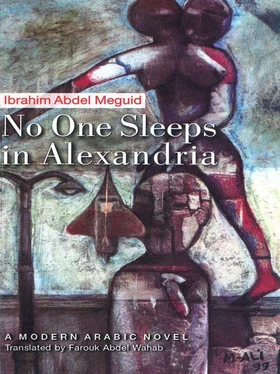The story of Lula reached Sitt Maryam and Zahra, who were surprised at the wiles of women and also of men, for Lula’s husband, who had seemed so jealous the day she was arrested, was now the very one accompanying her as she danced in the mansions. They had forgotten all about her, until the day they went out to the piazza in Karmuz. In the midst of the fishmongers and greengrocers and the stifling smells of the market, Sitt Maryam and Zahra saw a taxicab parked at the entrance of Sultan Husayn Street and a woman signaling to them from inside the taxi. They looked at each other in hesitation as they heard her voice, “Sitt Umm Camilla, Sitt Umm Yvonne.” It was unmistakably Lula’s voice. They went toward the taxi after looking around. What made them respond to her call in spite of their fear of being seen?
“Come on in. Don’t be afraid.”
She was sitting in the back seat and they sat next to her.
“Drive on,” she said.
“Where to?”
“Home.”
“The house is right there.”
“Drive to the door, buster. These are respectable women — do you want them to be seen in public with me?”
The driver fell silent, as did everyone. Zahra crept closer to Sitt Maryam and clung to her.
Sitt Maryam regretted getting into the taxi. Zahra must have gotten in because of her. “Here we are,” said the driver, as he entered a side alley and stopped.
They got out. Lula looked at him and laughed as Sitt Maryam smiled, but Zahra looked frightened. They heard the driver say, “Sitt Lula, are we not respectable folk, too?”
“Get a move on, you son of a club-footed woman,” Lula shouted, and the driver drove away laughing.
“Please pardon me, I would like to invite you to a cup of coffee at my place to see my apartment. Please, Sitt Maryam, Sitt Zahra. Sure, I may be bad, but I’m married. I’d even say I am good.”
As if hypnotized, they went in with her through the dark entrance of the house. They went up the stairs to the first floor, hardly able to see in the dark. Lula placed the key into the keyhole of the wooden door and opened it, then went ahead to open the windows, through which a little light entered, just enough to see one another and talk. Sitt Maryam and Zahra sat on the first two chairs they came across in the living room. Lula came back after a little while with a small spirit stove, a coffeepot, three cups, and a pitcher of water and sat in front of them on the floor. Lula looked prettier than she had in Dimitri’s house. “It feels like I kidnapped you from the street, right?”
Zahra did not answer, and Sitt Maryam told herself that silence was better.
“How are Sheikh Magd al-Din and Khawaga Dimitri?” asked Lula. “I used to hear Sheikh Magd’s voice as he recited the Quran at night — his voice went through the walls and came to me, a beautiful and soothing voice. Two days before my husband found me, I had intended to repent and go back to him because of Sheikh Magd al-Din’s voice, even though I didn’t understand anything from the Quran, but every time he said, ‘Which of the favors of your Lord will you deny?’ I would cry — really cry.”
Zahra said to herself, “I ask God Almighty for forgiveness.” She felt that it was not proper for the word of God ever to be uttered by that woman. They sat for a long time as Lula told them about the fight over her by the women’s troupes and how it was settled by the men: “The men can handle anything; you get nothing from women except lies and deceit.” She told them about the nights of the pashas, which rivaled those described in One Thousand and One Nights.
“Like who, Lula? Of course Abbud Pasha was one of them,” asked Sitt Maryam.
“All of them — Abbud, Farghali, Spahi, and Tawil. I once danced at Tawil Pasha’s mansion in the presence of Nahhas Pasha himself. Yes, he had just had an abscess removed and had come to Alexandria to recuperate. But, to tell you the truth, he was always looking at the floor. Maybe once or twice he raised his eyes to me. I felt he was afraid of me, not of the other political parties. How many parties are there in Egypt, anyway? At any rate, all pashas are generous, even Salvatorc Cicurel and Salvago, who own the streetcar lines. He bought me a streetcar.”
They all laughed for the first time. Caution and regret were now gone.
“The only one left is His Majesty the King,” Lula went on. “I danced for the princes. He’s the only one left. If I danced for him I’d work in films with Abd al-Wahhab and go to Cairo, and leave behind Alexandria and all these air raids. There’s hope next summer I’ll dance at Muntaza. The war would surely be over by then — it must! I’ve asked Sitt Didi, who lives here on Sultan Street. She’s the best designer of dance outfits. I told her to cut an outfit for me, open on all sides, from behind, front, and at the waist and along with the spangles and the beads and the rhinestones, to add some genuine diamonds. You know, Sitt Maryam, sometimes I miss you all very much.”
They drank the coffee. Zahra noticed that the living room was clean and the seats comfortable, not new but shiny. She also noticed some musical instruments — a lute, a tabla, a tambourine, cymbals, an accordion — scattered all over, some shiny, some old and dusty, but on the whole it was a comfortable place and appealing to the eye.
After they drank the coffee, Sitt Lula got up to bring some dance outfits to show them. Zahra looked at Sitt Maryam in dismay, but the latter calmly said, “Let’s see the outfits and leave without looking at anything else. We’ll never come to the piazza again.”
As they were hurrying down the stairs, Lula shouted, “Please send my greetings to Khawaga Dimitri and Sheikh Magd al-Din and to Camilla and Yvonne. I promise you I’ll dance at their weddings — I surely will!”
She had also told them about the foreign impresario who had promised her a trip to Europe, adding that there she would make good ubbayyig, and when she saw that they were puzzled, she said it meant she would make good money.
“The women who run the dance troupes have their own lingo,” she explained, laughing. “You say, for instance, today it is megamema, which means you’re out of work, and abriz means going to the bathroom, arkbi means food, and ayma means a big profit. There are many harder words that no one except these women can understand, because it’s all inspired by hashish.”
That strange meeting remained engraved in Zahra’s mind for several days. She looked at Sitt Maryam in confusion and fear; she had committed a sin against Magd al-Din.
One day Sitt Maryam surprised her by telling her in front of her daughters, “Why are you tormenting yourself, Zahra? You can go ahead and tell Sheikh Magd about our meeting with Lula. There’s no problem. I told Dimitri about it, and he laughed. But he said we shouldn’t go to the piazza, exactly as I had told you, and to buy our things here from Sidi Karim or from far away, from Bahari.”
So, it was not very serious; she could tell Magd al-Din. But she never did, Magd al-Din appeared to be in a state of constant silence. She wondered what he was so preoccupied with.
In that regard, he was not any different from Camilla, who returned to silence and despondency. She only spoke a very few words to Zahra—”How are you,” “Good morning,” “Good evening,” and nothing else. Zahra now saw her eyes always welling up with tears. The truth was that Camilla had become certain that she had taken a road of no return. She had advanced in her study of French in the Berlitz school in the summer, and when her regular school started she had not stopped her French lessons, changing her schedule from a morning to an afternoon one, as evening classes had been banned since the beginning of the war. There were two days on which she left Nabawiya Musa school, went to Berlitz, and returned home at about four o’clock. Yvonne had stopped taking French, deciding to resume it the following summer. Camilla asked herself many times why she was persevering in her study of the French language and longing to read the great poets — Baudelaire, Verlaine, Rimbaud, Éluard, André Breton, and Aragon — but she had no answer. She once found herself during a lesson repeating to herself the sentence that she had uttered unintentionally during the first lesson, “Je l’aime,” and discovered that she repeated it to herself frequently. Then she added, also without much thinking, “et il m’aime aussi.” Her eyes opened like two flowers and her small, rounded breasts quivered as fire swept through her tender body and she felt her nose catch on fire. Two days later, after she got out of school and had reached Fuad Street and was walking in the cold shadow of the big buildings on that wonderful Alexandrian autumn day, she felt that someone was walking along with her on the other side of the street, neither going ahead nor falling behind her. She felt rays coming from his direction, hitting her right check, waking up her blood. She turned and saw him. Fainting was not a sufficient solution. Her feet almost let her down, and she would have collapsed had she not leaned on a wall for a few moments. Then she saw him in front of her, smiling and happy.
Читать дальше












